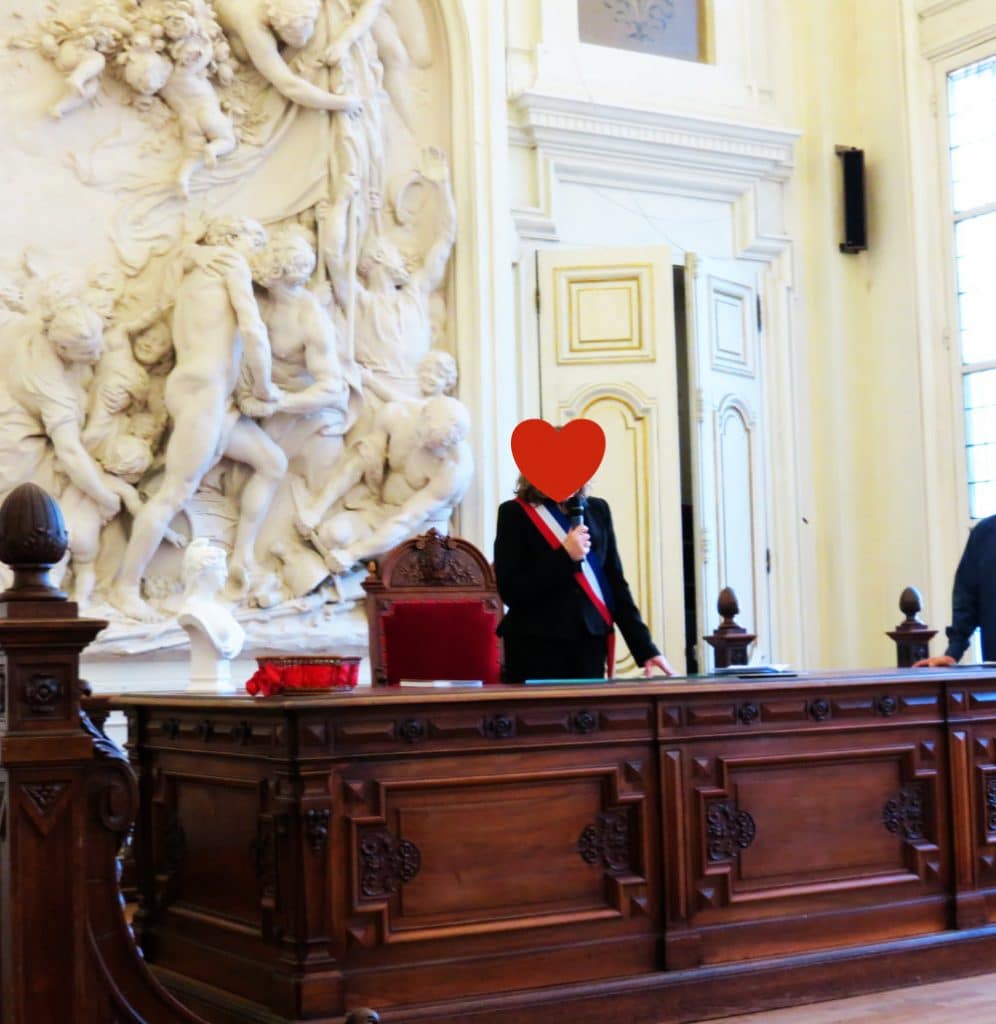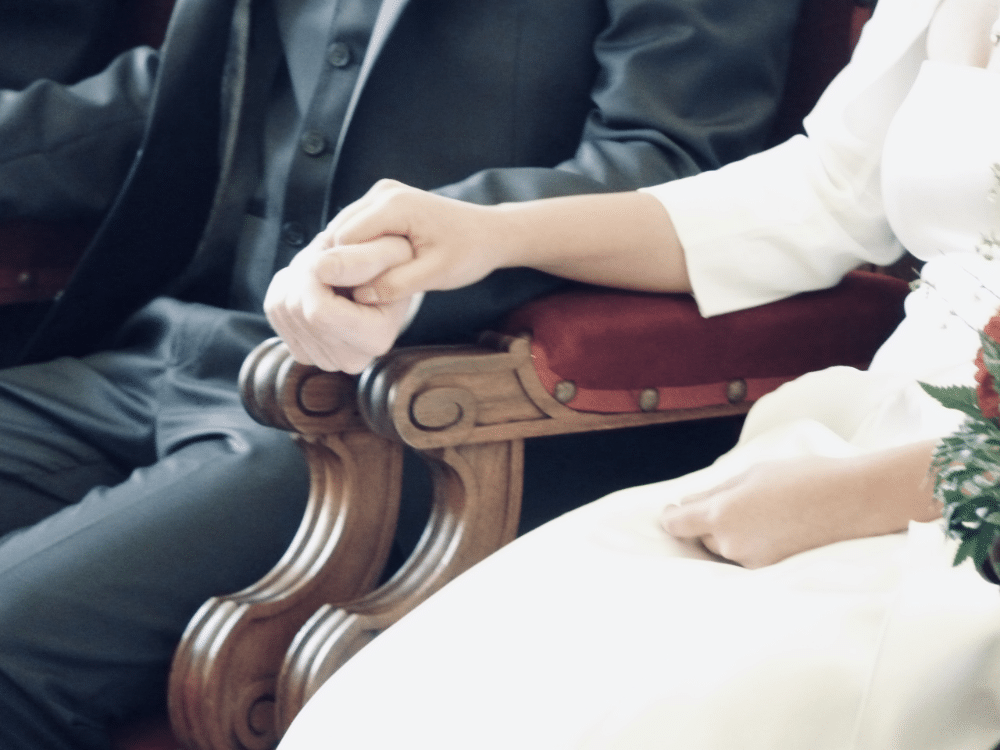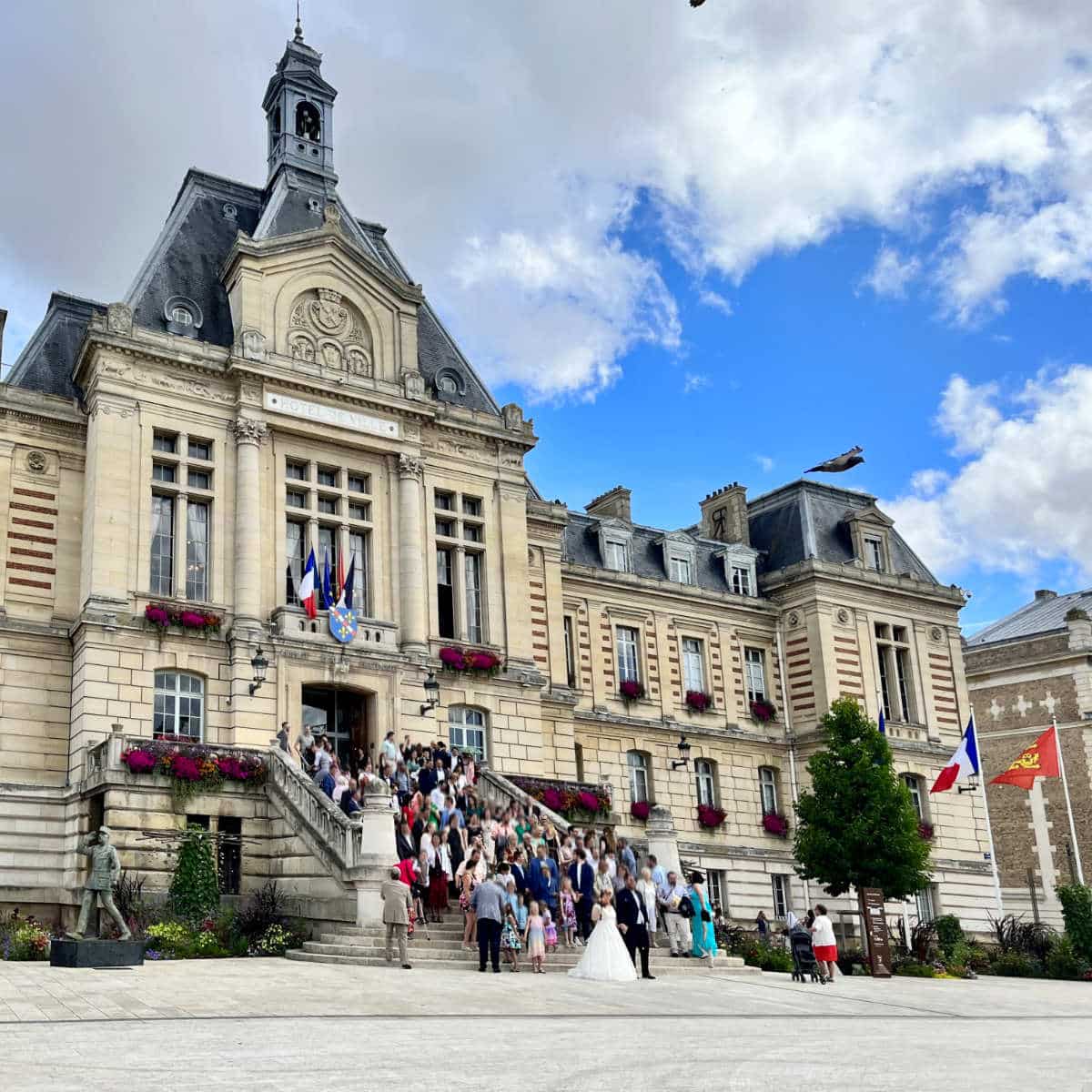Ah Paris, that romantic city of lights! And the Eiffel Tower, which is one of those iconic places people love to pop the question.
And yet, you don’t see many foreigners getting married in France. As a tourist, you can have a wedding ceremony in France (read about the traditions here), but it will not be a legal ceremony unless you complete all the paperwork.
That’s because marriages in France can only take place at the local town hall. A civil wedding ceremony is the only legally binding type of ceremony in France. Having an official civil wedding at another venue is not possible.
And since the ceremony has to be conducted by the mayor or a deputy, they vigorously check every piece of documentation to see that you are who you say you are, you are really in love, and that it is not a mariage blanche (a fake wedding for papers).
So as you can imagine the logistics and the paperwork required for a legal French marriage can be quite daunting. So let’s dive in, shall we? Allons-y!
1. Civil Marriages in France
As I mentioned, all legal weddings in France must be civil unions held at the local mairie (meaning “town hall”). Here, the wedding will be officiated by a public official. This is usually the mayor of the city, or his adjoint.

This type of civil ceremony is the only legally binding marriage ceremony possible in France. Both heterosexual and same-sex couples are entitled to legally get married in France.
There is also another type of legal status in France called the PACS which stands for “Pacte civil de solidarité”. It is a civil union with less rights and legal protections than marriage and is easier to dissolve. The PACS union is also is officiated by the mayor at the local town hall.
2. Picking the Town Hall Location
Given that you need a public official, you can’t actually just roll up in a fancy car to any old City Hall in France and ask to get married.
This would be quite tempting since there are some Mairies (“city halls”) in France that are gorgeous 17th-century classical buildings, while others are modern little boxes.
But there is no choice, the civil ceremony has to be in the town that you currently live in for at least 1 month, or where your parents live. For instance, if you live in the 5th arrondissement in Paris, that is the only mairie that you can get married in.
You cannot decide to get married in the mairie of the 6th, because they have a nicer building or if they offer you a date that is more convenient. Some people get around this by asking a relative/friend to sign a letter saying that they live with them.
But this can cause its own set of problems: Were both spouses living there? Were the spouses living apart? Is this a sham marriage? It also presumes you know somebody in that town.
Paperwork aside, I should note that many Mairies around France are stunningly beautiful. The Mairie in the Paris arrondissement where we got married was gorgeous, and I quite liked the idea of getting married there.
☞ READ MORE: 128 Romantic French Phrases to sweep you off your feet
3. Legalities and Paperwork for a Marriage license
As in all matters in France, you need a lot of paperwork to get married. The requirements are different from town to town, and even every arrondissement in Paris, but in general you need:
- a birth certificate that has been issued within the last 3 months, translated into French, with a certified apostille from the country issuing it.
- proof of residence in the town (justificatif de domicile)
- Passport or other proof of identity
- List of witnesses (2 for each spouse)
If you are widowed, divorced, or have children, you also have to provide all those wedding certificates, birth certificates, and death certificates as necessary. All documents have to be officially certified and officially translated into French.
Yes that means first the government body issuing the certificate puts an apostille, and then the official translator puts their apostille.
☞ READ MORE: French bureacracy: The birth certificate

4. Additional Documents if you are a getting married as a foreigner
And if you are a foreigner (i.e. not a French citizen), you will also need to provide to get married in France:
- A “certificat de coutume” issued by your embassy. This letter states that you fulfil the legal obligations to get married in your own country and that your country does not see any impediment to your marriage.
- A “certificat de célibat” or matrimonial capacity issued by your embassy. This letter is to provide proof that you are not married to anyone else.
- The list of translators that you used, along with photocopies of their Proof of Identity.
The foreign certificates of “coutume” and “célibat” are actually not that complicated because the embassies in Paris are quite used to it. At the Canadian embassy, I simply had to sign a letter saying I was not married to anyone else. They then promptly issued all the letters for me (for a price!).
Official “assermenté” translators also know what is required, and will give you the documents without you having to ask.

If you are a foreigner, however, they may be more strict on what they need from you for Proof of Residence, to avoid “sham marriages”. In this case, they will ask for proof that you live together, income tax returns, bank accounts, etc.
Basically, it can be anything and everything, depending on the bureaucrat at the Mairie who is dealing with your marriage application. Be mentally prepared.
5. The Prenuptial agreement and Marriage contract
France has very strict laws on marriage, children, and inheritances, so when you get married you are required to choose amongst 3 options:
- Séparation des Biens – Everything stays separate, even after marriage.
- Communauté Réduite aux Acquêts – the most common one, what was yours before the marriage remains yours, but everything acquired after is combined.
- La Communauté Universelle – Everything is combined regardless of when you got it.
If you pick anything other than Communauté réduite aux acquêts, you will need to write up a marriage contract with your French notaire (notary) and submit it along with your application to get married.
France has strict inheritance laws where the surviving spouse retains half of the communal property, the remaining half is divided amongst any children.
If one spouse is significantly wealthier than the other, or if there are children from a previous relationship, the couple are advised to get a prenuptial agreement to protect the rights of both spouses and any previous or future children. This is called a “contrat de mariage“.
A prenuptial agreement must be notarized by a legal notary in French and submitted along with your application to get married.
6. Publication of Wedding bans
In France, the marriage banns must then be posted outside the Mairie at least 10 days prior to your wedding. This will be done by the Mairie once they go through your application.
If you were planning on a rush wedding date, you will have to hold your horses. There are only certain slots when weddings are officiated. If the Mairie is beautiful and you want a summer wedding, you will have to put in your application months in advance.

7. Religious weddings
If your head is spinning looking at this list of documents, welcome to my world. Now, I should point out that you can decide to legally get married outside of France. You can then just have a religious wedding in a church, or any type of alternate wedding ceremony in France, such as in a château, hotel, garden, etc.
In this case, legally you will have been married elsewhere, and you don’t need a French civil union. (I did consider running off to Vegas when I saw the list of paperwork, but caught myself.)
If you’re eyeing a French religious ceremony for your wedding, you should also be ready for a bit of prep work. It usually means diving into some wedding prep classes with the priest.
These classes tend cover everything from the nitty-gritty of the faith to the ins and outs of saying “I do.” It is usually not just about memorizing wedding vows; it’s a chance to chat openly with the priest about your relationship and the meaning behind those vows.
If you don’t have any family or connection to France, getting legally married overseas and holding a wedding ceremony in France probably your best bet. (Or just the bachelor party!)
A lot of French people have a civil ceremony at the Mairie, and then do a religious church wedding later. It can either be on the same day or months apart.
8. Practical advice
If you do live in France and plan to continue doing so, my advice would be to slog through the paperwork to go through a civil marriage in France.
For one thing, you will have to register your wedding in France anyway, so you would just be trading in one boondoggle for another. For another, because we got married in France, it was so much simpler to fulfill other French bureaucratic requirements.
A “new” marriage certificate that is less than 3 months old (same explanation as birth certificate above) is required for occasions as for the birth of the children, every visa application, and the French nationality application.
All the Mairies in France let you order these documents online. So every time you need a copy of your marriage certificate, you can get one with a few clicks of the mouse for free. I don’t know if the Las Vegas City Hall is going to offer you that level of service.
Vive technologie! Long live technology!
☞ READ MORE: Changing the Last Name after Marriage: the French Compromise

So have I put you off the idea of getting married in France? Are you going to “cheat” and have the civil ceremony elsewhere?
If you enjoyed that article, you may want to read more about wedding traditions in France. A bientôt!





Attention: the documents issued for the marriage of Canadian citizens in France have changed recently. Please see instructions below. If you are coming to France to get married and settle down, you will have to have a long-term visa prior to arrival on French territory. The visa application must be made in Canada at the French consulate nearest to where you live .